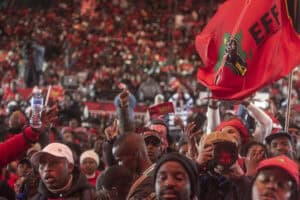The reverend, who came to SA to honour Mama Winnie. says the country is now experiencing economic apartheid.

US civil rights leader Reverend Jesse Jackson says South Africans must never feel inferior and must stand up and fight to extinguish the slave mentality to attain economic freedom.
He said in the US slavery was extended as a kind of apartheid after its legal abolition.
“We are out of legal slavery, but we do not have access to capital,” he said, adding that real liberation was about ending legal segregation and having greater access to capital, technology, industry and land.
Speaking at Wits University yesterday, Jackson warned South Africans not to be their own enemies: “It’s one thing to be told you are inferior, it’s another to internalise it.
“Don’t self-destruct, don’t self-degrade, develop a strong mind.”
He urged South Africans not to forget the roles played by their leaders to achieve freedom, or that at one time they were not free but had achieved it now.
Do not forget the spirit of the ancestors and draw strength from leaders like Winnie Madikizela-Mandela, he added.
He pointed out that she was made to suffer degradation in various forms, including banishment, which made her an exile in her own country.
“You must measure human rights by one yardstick. Don’t demean those who fought for freedom and against injustice.”
Jackson said that 24 years after democracy, blacks were not economically free in South Africa and whites were free and richer.
“Blacks are freer, whites are richer. Then you had political apartheid, now you have economic apartheid.
“Today we are free but not equal. Today we can vote; today we have a black president, but we are not free economically,” said Jackson.
Blacks would never be completely free until they ran the economy.
“Our struggle is not to get free alone, our struggle is for equality.
“Freedom was merely necessary to attain equality. Slavery and apartheid have ended, but we are not equal,” he said.
Jackson took a swipe at the US government and the West for bombing Syria when they failed to act similarly harshly against apartheid in South Africa.
He said at some stage there must be reparation for the damage done to the black people by apartheid.
He added, in answer to a question: “There must be a fairer distribution of resources in Africa.”
For more news your way, follow The Citizen on Facebook and Twitter.






